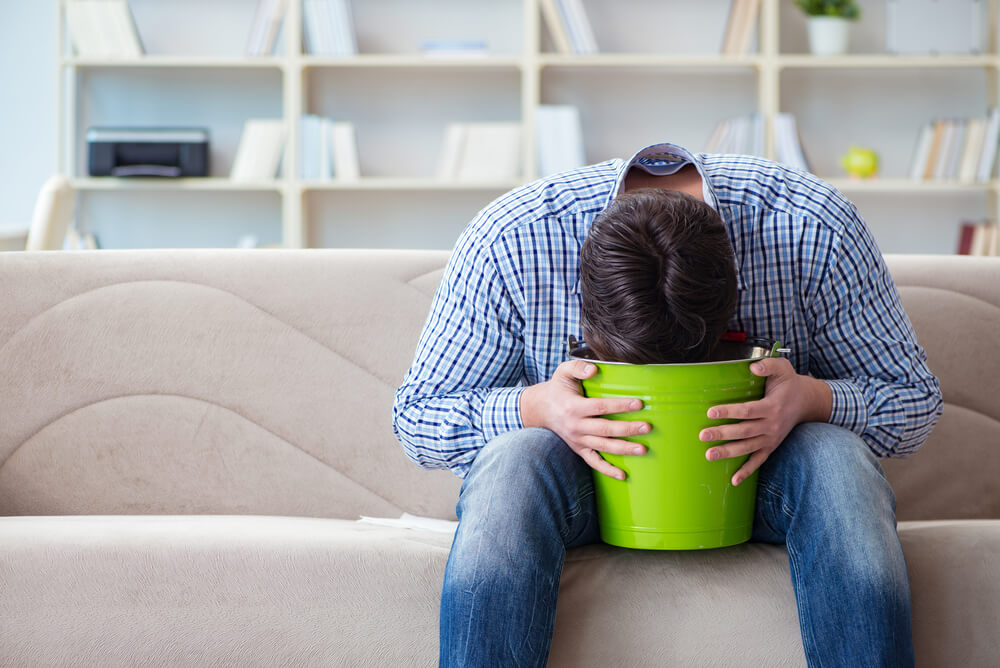We have all probably woken up one day feeling extra sluggish. Then we went on throughout the day and felt even more low-energy. The next few days may turn into nausea, fever, or chills. If you had roommates or lived with your family at the time, they may have come down with the same mystery illness as well. This is because the flu is often contagious. You all may have had the stomach flu.
Now on a different note, you may have tried some new restaurant and went home feeling green or sick. Maybe you tried a new food or ate something your stomach was not used to. There could have been bacteria in your food. Did you have diarrhea after eating? If you find yourself hugging the toilet bowl all evening, you may have consumed contaminated food and are likely experiencing food poisoning. A good way to pinpoint if you were food poisoned is to see if anyone else who ate the same food became sick as well.
Stomach Flu vs. Food Poisoning
If you find yourself sick to your stomach and running to the bathroom every hour to empty what you thought you already did, there is something wrong. Vomiting and diarrhea are some of the common symptoms of both the stomach flu and food poisoning. You may be wondering what you’re dealing with so you can get better or at least find some peace of mind. Figuring out if you are suffering from the stomach flu vs. food poisoning can be tricky since symptoms are relatively alike.
How to Tell if You Have Food Poisoning Vs. Stomach Bug

If you’re going over the things you ate in your head or wondering if you were around someone else sick, you may be wondering if you have the stomach flu or food poisoning. Neither is fun, and illness has an even bigger stigma post-pandemic. Did I eat something contaminated? Who was I around? Who have I seen since? Knowing what you’re dealing with can help you decipher if you should stay away from others if you are contagious.
Determining the onset of your symptoms can help you figure out if you are suffering from the stomach flu or food poisoning. Food poisoning comes fast, whereas a stomach bug will slowly worsen for a few days to 12 hours. On the contrary, a stomach bug progresses gradually. You will know if you ate contaminated food if you are rushing to the toilet a few hours maximum after eating. However, if you ate food contaminated with a parasite, it could take your body weeks to show symptoms.
Why Do I Have Food Poisoning?
Poor food handling is the main reason why people get sick from food poisoning. If you are cooking, it is important to make sure that you wash your produce and look out for expiration dates. Expiration dates are there to indicate the freshness of food. If you eat food past the date, you run the risk of eating something where bacteria has grown, turning your stomach to knots.
People also suffer from food poisoning if they eat improperly cooked meats. Different bugs like Salmonella can survive inadequate cooking temperatures. Be careful during the summer grilling season because salmonella thrives in warmer temperatures. Be sure to cook your meat properly always but especially during July and August.
How to Treat Food Poisoning
You are sick and exhausted; it can be hard to imagine better days. If your child has a batch of food poisoning, you can comfort them and mitigate their symptoms. You can also give your child kids diarrhea medicine if the symptoms are unbearable. There are a few ways to ease your food poisoning symptoms which we highly recommend trying:
- Drinking Fluids
- Your body is very dehydrated if you are experiencing vomiting and diarrhea. It is imperative to refuel your water levels to make your symptoms feel more at ease and flush out the toxins you consumed. Drinks with electrolytes are a great fluid to opt for because they help your body stay hydrated longer. Some common fluids with electrolytes are sports drinks and coconut water. The fun flavors also may distract your child from the symptoms they feel.
- OTCs
- Certain over-the-counter medicines may help soothe your nausea. The FDA does not recommend antidiarrheals or bismuth subsalicylate for children. However, you can choose the kid’s diarrhea medicine version for a proportionate dose that is safe for children to consume.
- Probiotics
- Probiotics will help your digestive tract and balance the biome of your gut with good bacterias. When you have food poisoning, your gut has likely been invaded with harmful bacterias. By taking probiotics, you can balance out the bad bacterias. Again, if you decide to give your child probiotics, use a child-safe option for kid’s diarrhea medicine. Also, by taking probiotics daily, you could strengthen your gut to prevent future food-borne illnesses. Maybe consider adding yogurt to your family’s diet.
What to Eat After Food Poisoning

There are certain foods that you should avoid if you are sick with food poisoning. You want to eat foods that will make your stool firmer, and your body calm if you’re wondering what to eat after food poisoning.
- The BRAT diet
- If you’re wondering what to eat after food poisoning, this tip is for you. The BRAT diet is not for misbehaving children. It is a diet that is great for a sensitive stomach. Certain foods are lighter on your stomach and easier for your body to digest. The diet consists of bananas, rice, applesauce, and toast. The low-fat diet makes your stool more firm, so eating like this will decrease the likelihood of diarrhea. You can include broth in this diet as well. But even if you decide not to follow this diet, try to eat smaller portions with a low-fat content until you or your child feels better.
- Mint or Ginger Tea
- Both mint and ginger flavors aid in soothing an upset stomach because of their unique properties. A few small ginger snap cookies might be the perfect combo for your hot tea. Ginger can help you feel less nauseous, and mint is known to soothe the gut. The warm herbal water is also calming, which can help relax the body while you or your child is sick.
Suppose you or your child’s fever exceeds 100.5 degrees Fahrenheit, or you or your child experiences blood in the stool, blurry vision, extreme pain, or severe dehydration; you should see a doctor and schedule your child an appointment with us right away. Food poisoning can be tough, and if diarrhea lasts more than three days, you should also make your doctor aware.
Conclusion
Whether you or your child has a stomach bug or food poisoning, there are specific steps you can take to make you both feel better. Rest and relaxation is the best way to help your body heal. Schedule an appointment with Worldwide Pediatrics Group if you think your child may be afflicted. We focus on assisting children to be their happy, healthy selves. Give us a call today to schedule an appointment.



